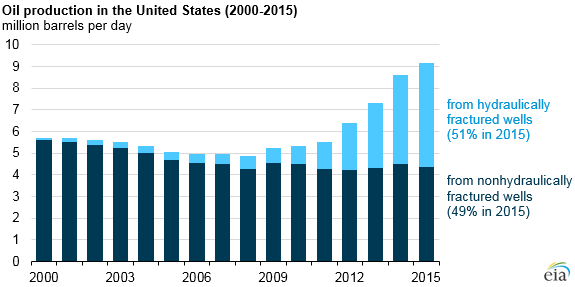Articles Menu
Environmental Protection Agency officials made critical last-minute changes to their presentation of a multiyear report on hydraulic fracturing, which served to downplay the oil and gas drilling method's threat to drinking water supplies, an investigation by APM Reports and Marketplace found.
Some of the agency's own scientists criticized the changes and rebuked the key conclusion, APM and Marketplace reported.
Hydraulic fracturing — or fracking — is one of two technologies that has underpinned a boom in U.S. oil and natural gas production. Frackers inject a mix of water, minerals and chemicals into the ground at high pressure to fracture shale rock and release oil and gas. The practice is widely opposed by environmentalists.
The EPA's final press release and executive summary of the five-year study emphasized a key phrase: "hydraulic fracturing activities have not led to widespread, systemic impacts to drinking water resources." Energy industry groups and media organizations, including CNBC.com, have widely cited the finding in discussions of fracking's safety.
The phrase was added to a draft press release in May prior to its public release in June, the investigation found.

The EPA's messaging had earlier put more emphasis on vulnerabilities to water supplies and about two dozen cases in which fracking operations had affected water resources, according to drafts obtained by Marketplace and APM.
The revelation comes as President-elect Donald Trump has vowed to roll back regulations on the American oil and gas industry in a bid to boost production.
The reporters could not identify who was directly responsible for the shift in focus, but emails obtained through the Freedom of Information Act showed EPA officials and media consultants met with advisers to President Barack Obama to discuss marketing the study.
People familiar with the research called the choice to say there was no "widespread, systemic" impact on water supplies from fracking, "bizarre," "irresponsible" and "ambiguous."
The broad conclusion was simply not backed up by measureable data, according to Peter Thorne, chairman of the EPA's Science Advisory Board.
"We suggested that they provide a definition of 'systemic,' a definition of 'widespread' and then provide quantitative data to support the conclusion," he told Marketplace and APM. "That is all a way of asking them to put that kind of scientific rigor behind a statement as broad as that."
A number of current and former EPA officials declined to comment to APM and Marketplace. One former EPA official defended the study, telling reporters the agency had to offer a nuanced message because the study did not produce a definitive conclusion.
Scientists are revising the study and EPA officials say they hope to release the results by the end of the year.
In a statement to CNBC, the agency said: "EPA's study included the development of multiple research projects involving the analysis of existing data, scenario and modeling evaluations, laboratory studies, toxicological assessments and five case studies. To date, the study has resulted in the publication of multiple peer reviewed scientific products, including 13 EPA technical reports, 14 journal articles and the draft hydraulic fracturing drinking water assessment. EPA anticipates finalizing the assessment report by the end of the calendar year."